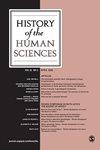“巧妙的实践接触系统”:哥伦比亚大学师范学院儿童福利研究所的历史起源与发展(1922 - 1936)
IF 0.5
2区 历史学
Q2 HISTORY & PHILOSOPHY OF SCIENCE
引用次数: 1
摘要
在20世纪的头二十年里,美国私人基金会和慈善倡议的扩张与以儿童为核心的进步教育和战后社会重建的全面、全国性议程相融合。从1924年到1928年,劳拉·斯佩尔曼-洛克菲勒纪念馆是积极、系统地资助北美儿童发展运动的主要基础。1924年在哥伦比亚师范学院成立的儿童福利研究所是美国大学第一个由洛克菲勒资助的此类项目。该研究所在帮助其他大学建立全国儿童福利研究所网络方面发挥了重要作用。12年后,它也将是这些研究所中第一个关闭的。尽管如此,该研究所的背景、出现和发展一直被以前的学术忽视或歪曲,需要进行新的批判性历史分析。通过借鉴大量档案来源和未发表的材料,本文对研究所内部往往不稳定的历史进行了批判性的重建,强调了其起源、成员和行政变革。我认为,该研究所的消亡应该从20世纪20年代末慈善政策的修订以及该研究所对教学和培训的独特重视来理解。由此产生的叙述使人们能够更深入、更知情地了解研究所的起源及其最终的折叠。本文章由计算机程序翻译,如有差异,请以英文原文为准。
An ‘ingenious system of practical contacts’: Historical origins and development of the Institute of Child Welfare Research at Columbia University's Teachers College (1922–36)
During the first two decades of the 20th century, the expansion of private foundations and philanthropic initiatives in the United States converged with a comprehensive, nationwide agenda of progressive education and post-war social reconstruction that situated childhood at its core. From 1924 to 1928, the Laura Spelman Rockefeller Memorial was the main foundation behind the aggressive, systematic funding of the child development movement in North America. A pioneering institution, the Institute of Child Welfare Research, established in 1924 at Columbia's Teachers College, was the first Rockefeller-funded programme of its kind at an American university. The Institute was influential in helping set up a nationwide network of child welfare institutes at other universities. Twelve years later, it would also be the first of those institutes to close. Nonetheless, the Institute's context, emergence, and development have been overlooked or misrepresented by previous scholarship, which calls for a new, critical historical analysis. By drawing on a number of archival sources and unpublished materials, this paper offers a critical reconstruction of the Institute's internal, often unstable history, emphasizing its origins, members, and administrative changes. I argue that the demise of the Institute should be understood in the context of both the revision of philanthropic policies in the late 1920s and the Institute's singular emphasis on teaching and training over research. The resulting narrative allows for a deeper, more informed understanding of both the Institute's origins and its eventual folding.
求助全文
通过发布文献求助,成功后即可免费获取论文全文。
去求助
来源期刊

History of the Human Sciences
综合性期刊-科学史与科学哲学
CiteScore
1.60
自引率
11.10%
发文量
31
审稿时长
>12 weeks
期刊介绍:
History of the Human Sciences aims to expand our understanding of the human world through a broad interdisciplinary approach. The journal will bring you critical articles from sociology, psychology, anthropology and politics, and link their interests with those of philosophy, literary criticism, art history, linguistics, psychoanalysis, aesthetics and law.
 求助内容:
求助内容: 应助结果提醒方式:
应助结果提醒方式:


